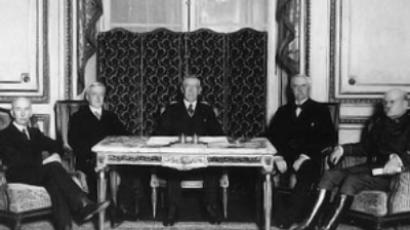Versailles Treaty 90 years on: international law still ignored
Even though it has been 90 years since the Treaty of Versailles, a peace deal signed at the end of WWI which ended the conflict between Germany and the Allied Powers, its legacy is still being felt today.
The US refused to sign it, and instead made its own treaty with Germany.
Peace without victory
In Paris the world’s great powers gathered to create a new world order after the most devastating war in history. The first order of business was Germany.
The chief loser in the war, Germany was forbidden from threatening its neighbors ever again. She was demilitarized, made to pay massive reparations, and more importantly made responsible for the war.
One day Germany would look for revenge, but what ultimately made the next war inevitable was the type of world system the Treaty of Versailles made.
America had abandoned its own grand security project, The League of Nations, and thus made it unworkable.
However, another idea sponsored by the Americans was the concept of self-determination for all nations. For the winners of the war this idea was embraced. For the losers, it was a disaster and for many of the people they ruled over.
Poland was given a corridor to the sea through the German region of Prussia, splitting Germany in two. British global influence expanded greatly.
The French received Syria and Lebanon. Japan acquired Germany’s pacific islands. In the end, China refused to sign.
Faults live on
The Versailles system changed the world forever and remains in effect today, yet it continues to falter.
“Don’t set up a system of alliances or security system you are not strong enough to maintain. If you are not strong enough to maintain it, then compromise,” believes Anatol Lieven, professor of war studies in King’s College.
“Make deals accordingly. I think that is something we would have done well to remember after the Cold War, because the Americans in particular – the Europeans, too – committed themselves to all sorts of things and places, and then discovered they were not strong enough to push it through. And we are still living with the results.”
When the strongest powers support a small nation’s bid for statehood, they can openly ignore international law and world opinion.
Kosovo was backed in its goal of independence from Serbia, even though it was illegal.
At the same time, the new states of South Ossetia and Abkhazia are ignored. When a country is deemed to have lost a conflict, it should totally submit to the victors. This happened when the Soviet Union collapsed in 1991.
“Russians interpreted it as either a deal or at best surrender under terms,” said Anatol Lieven.
“Americans and many Europeans as well saw it like 1945, as unconditional surrender on the part of Russia, and tried to make a kind of Versailles-style peace at Russia’s expense which, of course, Russia, like Germany after 1919, was simply unprepared to live under.”
The Treaty of Versailles was signed in the Hall of Mirrors. A mirror image of what went wrong at Versailles remains with us – international law should apply to all in equal measure. This settlement started out with great hopes, but its greatest weaknesses stay with us to this day.













